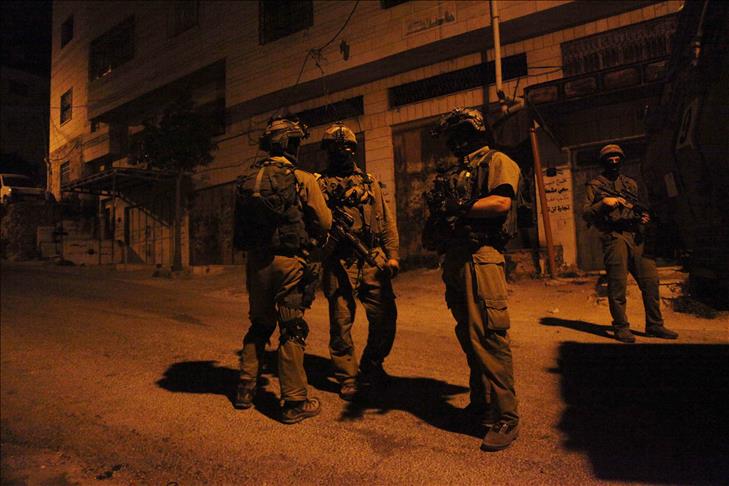
By Abdel-Raouf Arnaout
JERUSALEM
A massive Israeli police presence in the East Jerusalem neighborhoods of Shuafat and Beit Hanina has become a common sight.
Throwing stones at Israeli police, meanwhile, has become a local pastime. But stone-throwing is no longer restricted to the two neighborhoods, and is now common in other neighborhoods in the city, where more than 370,000 Palestinians live.
"Stone-throwing is done in reaction to Israeli practices against Palestinians," Adnan al-Husseini, Jerusalem affairs minister in the Palestinian government, told Anadolu Agency.
"It is normal for the Palestinians to pelt the Israelis with stones – their only available means of defense – when the Israelis fire teargas and birdshot at them," he said.
The abduction and murder in early July of a Palestinian teenager in Shuafat by Israeli settlers has led to violent confrontations between Palestinian residents of Jerusalem and Israeli troops.
These confrontations became even more intense after a recent Israeli offensive against the Gaza Strip, which came to an end on August 26 after Palestinian factions signed a ceasefire deal with the Israeli government.
Nevertheless, some observers draw links between Palestinian stone-throwing and settler violations against the Al-Aqsa Mosque and settlers' repeated attempts to break into the mosque compound.
Al-Husseini said these links were clear, asserting that Israel should end its occupation of Jerusalem and stop its provocations at the Al-Aqsa Mosque in order to convince Palestinians to stop throwing stones.
The Shin Bet, Israel's domestic security agency, noted a marked increase in the number of Palestinian attacks on Israeli troops in Jerusalem in recent weeks. The agency pointed to 11 attacks on Israeli troops in East Jerusalem in June, compared to a whopping 83 attacks in July.
On its website, the Shin Bet said Molotov cocktails had been used in 77 of these attacks, explosive charges in five, and firearms in one.
Silent intifada
Jerusalem Mayor Nir Barkat described continued stone-throwing by Palestinians in Jerusalem as a "silent uprising," according to Israeli media.
Stone-throwing in Jerusalem's Old City recalls the days of the first Palestinian uprising (Intifada), which erupted in late 1987 and lasted for several years.
Masked Palestinian men used stones to resist the Israeli occupation troops who would storm streets and alleyways in Palestinian neighborhoods.
Palestinians had also used old car tires and garbage dumpsters to block the entry of Israeli army vehicles.
While pelting Israeli troops with stones, Palestinian youths will often raise the Palestinian flag with the other hand.
The young men throwing stones say they do it to express their anger vis-à-vis Israeli practices in Jerusalem in general and at East Jerusalem's iconic Al-Aqsa Mosque in particular.
Despite its relative simplicity, the perennial stone-throwing has ruffled the feathers of Israeli politicians.
In early August, Israeli Prime Minister Benjamin Netanyahu met with government and security officials to assess the security situation in Jerusalem.
After the meeting, Netanyahu's office said that Israeli police had been ordered to deal firmly with stone-throwers, with the prime minister saying the practice would "not be tolerated."
Unrelenting
Two months later, however, stone-throwing in the Old City remains rampant. This prompted Netanyahu to say Sunday that his government would not allow anybody to "divide" the city.
"We will confront these people with an iron fist," he asserted.
He said violence was only common in the eastern part of East Jerusalem, claiming that this was an "indivisible" part of the city.
Netanyahu went on to say that his government would not tolerate stone-throwing in the city.
"We will use all means to rein in this phenomenon," he said.
Netanyahu did not reveal what measures his government would take to stop stone-throwing. But observers have noticed a marked rise in the detention of Palestinians in the city, along with a stepped-up Israeli police presence – especially at night.
Moussa Qusse, director of the Palestinian Prisoners' Society, a local NGO, said Israel's detention of Palestinians in Jerusalem since July – around 700 in East Jerusalem alone – was unprecedented.
"This is unprecedented given that we are only talking about a period of three months," Qusse told AA.
He said minors had been among the Palestinians recently detained by Israeli troops, adding that most were between the ages of 17 and 22.
Anadolu Agency website contains only a portion of the news stories offered to subscribers in the AA News Broadcasting System (HAS), and in summarized form. Please contact us for subscription options.

